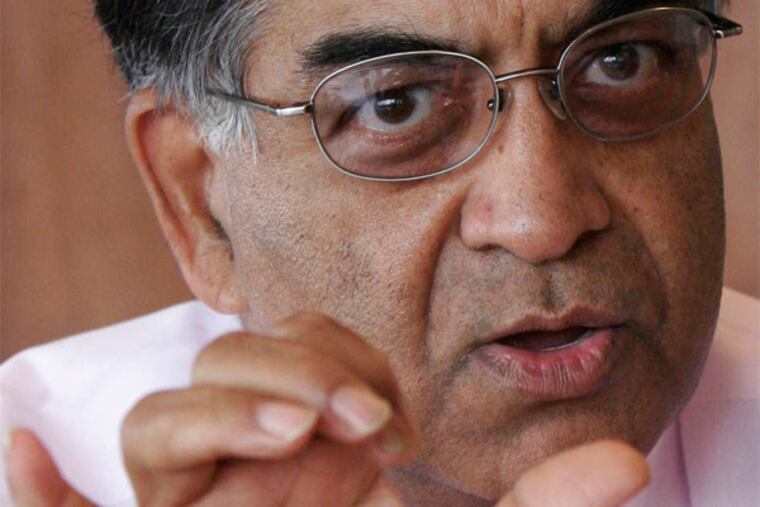CEO Rajiv L. Gupta offers counsel on topics including CEOs
You would think Rajiv L. Gupta was busy enough with his day job. The last chairman and CEO of Philadelphia-based Rohm & Haas, which he and his shareholders sold to Dow Chemical for $18 billion four years ago, Gupta runs Avantor Performance Materials, a $500 million (yearly sales) chemical company with plants on four continents, which he hopes to sell at a profit "in the next two to three years."

You would think Rajiv L. Gupta was busy enough with his day job.
The last chairman and CEO of Philadelphia-based Rohm & Haas, which he and his shareholders sold to Dow Chemical for $18 billion four years ago, Gupta runs Avantor Performance Materials, a $500 million (yearly sales) chemical company with plants on four continents, which he hopes to sell at a profit "in the next two to three years."
But minding his own business isn't enough. Gupta is also busy helping run other public companies - and advising fellow CEOs.
Gupta has been a director of Tyco International (since 2005) and Delphi Automotive Group and Hewlett-Packard Co. (both since 2009) as each went through wrenching change. And he has been a trustee at Malvern-based Vanguard Group since 2001, as it has grown into a $2.2 trillion-asset investment-fund giant.
Gupta, who was at Rohm & Haas for 38 years before its sale to Dow Chemical Co. in 2009, fed on his experience in a recent talk at Drexel University's Center for Corporate Governance, an eight-year-old group run by finance professor Ralph Walkling. The center counts CEOs of Vanguard, Campbell Soup Co., and other big firms on its advisory board. Members share war stories, argue best practices, and test ethical questions - because whom can a CEO consult, if not another CEO?
"We're trying to raise the bar for corporate governance, so board members can make better decisions, and be sensitive to issues," said Richard Jaffe, a partner at Duane Morris L.L.P., who chairs the advisory board.
Directors at big companies can collect as much for attending a few meetings as a typical worker earns in a year. It's a big job, Gupta insists. With tighter U.S. director-liability guidelines and the explosion of accessible business data, directors need to question CEO claims and help set strategy, and not just rubber-stamp staff proposals like in the old days.
Here is Gupta's list of director priorities:
Picking the CEO
"If you get it wrong, the consequences are huge. If you get it right, the results will take a while, but the results are absolutely outsized," Gupta says.
It's a sign the board has done its job when a company promotes from inside, he adds. But not too far inside. "If you allow the CEOs to guide the process of hiring their own new CEOs, they find someone like themselves," said Gupta, even if times call for change. "The board has to be very active in getting someone they can live with," he said.
Strategy
Boards need to ask tough questions on issues CEOs might not prioritize. When Edward Breen, past CEO at Mercer County-based Tyco, proposed spinning off key businesses, "half the board said, 'Why aren't we doing more, and growing the whole portfolio, as opposed to breaking up these companies?' " Gupta recalled. Breen spent six months detailing the problems and winning votes. When the spin-offs boosted share values, Breen and his board shared credit.
"That's also the way Bill [McNabb] runs Vanguard," Gupta said. The group's tight management focus, backed by supportive directors, helped it boost sales after 2008, even as the financial crisis damaged rivals.
Risk
Boards should insist companies prepare not just for global, national, and competitive threats, but for what Gupta calls "bottoms-up risk." He explained: "I spent most of my life in chemicals. How do you ensure your training and environmental standards are the same all over the world? The cost of getting this wrong is pretty high."
Executive pay
Gupta targets CEO compensation, not at top rivals' high levels, but "at the median of the industry," plus more for beating financial and strategic goals.
But how much is too much, at a time when CEOs are ever richer but more American workers earn less? "Darn good question," Gupta answered. But he still is comfortable with salary comparisons to a CEO's peers.
Owners
Institutions that own stock have grown more willing to challenge corporate CEOs, so directors at Hewlett-Packard and other companies are reaching out to these stockholders. Gupta credits past Vanguard boss Jack Brennan with "this idea that boards should consider having a shareholder committee, where voices are actively sought."
"Wouldn't you want to listen to what shareholders think of your management or strategy? These guys are smart as hell," Gupta added.
Behavior
Directors have to insist that fraud, bad behavior, bribery, and embarrassing misconduct are punished, Gupta says. "Certain types of people work for large corporations. They know the rules."
Can firms be too strict? "If you have a large organization with hundreds of thousands of people, and if you don't have any consequences for right and wrong, you can't function," Gupta said. "Will the big companies lose out on wild-guy entrepreneurs? Possibly. But the possibility they'd go on to do something really bad" is a worse risk.